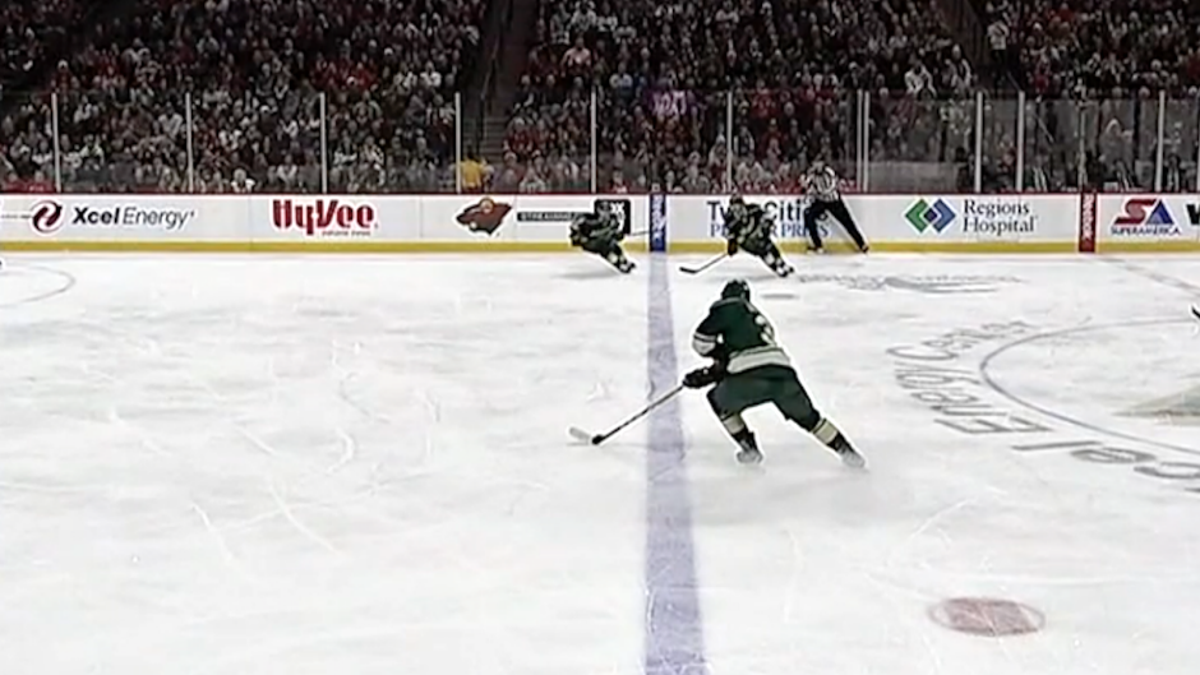
The NHL is in its second season of allowing head coaches to challenge the legality of scoring plays with an offside review. There's been plenty of frustration with the process over the past few years, but Wednesday night's Blackhawks-Wild game in Minnesota may have brought a new low.
Nearly halfway through the second period, the Wild managed to tie the game on a play that featured Zach Parise redirecting the puck in front and then burying his own rebound. It was an impressive goal, but Chicago's coach Joel Quenneville used his challenge to contest that Parise was offside on the zone entry before the score.
Upon further review, it certainly looks like the entry pass crosses the blue line and lands on the stick of Wild forward Charlie Coyle before Parise is able to skate fully back to the line and tag up.
After a six-minute review (which featured the use of both a tablet and an iPhone) the officials on the ice deemed that the replays were "inconclusive" and allowed Parise's game-tying goal to stand. Here's the official ruling from the NHL's Situation Room:
It appears that the issue here is that the best look at the play comes from behind Coyle as he receives the puck, meaning it's difficult to tell the precise moment when the puck touches his stick. That leads to the end result of "not conclusive," but common sense says that it's incredibly likely Parise was offside.
Here are the best looks at the approximate moment Coyle receives the puck:
In both of those frames, the play is still clearly offside. Even if it's not conclusively the exact frame in which Coyle receives the puck, it's a fraction of a second away. Parise is far enough away from the blue line to make a conclusive ruling that even Wild fans probably wouldn't protest.
Many of the the offside challenge criticisms surround it so often being used to review an entry that is so incredibly close -- like when a player's skate hovers above the blue line just inches off the ice. Other criticisms surround it being used to challenge a potential offside well before play was established in the zone and the scoring play occurred. Both of these situations make an offside pretty insignificant to the play.
This wasn't one of those plays.
The situation in Wednesday night's game is a strong case for the existence of the challenge, as the offside looked to be egregious enough to warrant a quick overturn of the call on the ice. But the result in Wednesday night's game is a strong case for fixing the challenge or completely eliminating it altogether.
Not only did the review take long enough to disrupt the flow of a very entertaining and fast-paced hockey game, it looks pretty clear that they got the call wrong anyway.
The league and its officials are worried about being so excruciatingly precise when it comes to these reviews that it's even more maddening than missing the original call in real-time. The concern over being 100-percent conclusive is overruling common sense, so either the NHL needs to provide additional technology (more/better cameras or tracking sensors) to arrive at a quicker, unquestionable result or they just need to recognize the review process is flawed.
